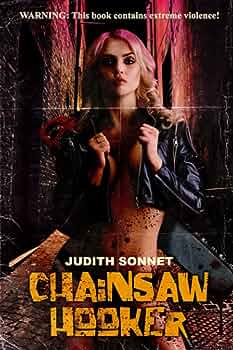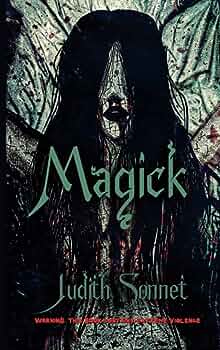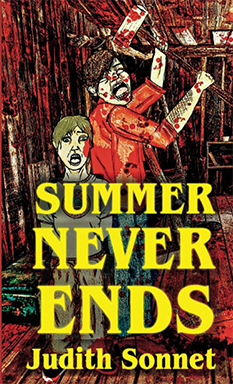I first discovered Judith Sonnet after a book reviewer promoted her novel, The Clown Hunt. Even though I’m sick of the clown trope, the book sounded unique compared to other clown horror books. I added it to my TBR and purchased a copy from Sonnet herself when I met her at Killercon (she’s so nice, by the way, and I feel fortunate to call her my friend).
I absolutely fell in love with that book! Sonnet has a way of writing some of the most brutal yet creative torture and murder scenes. But unlike other authors in the extreme horror genre, she writes relatable and likable characters, so you can’t help but root them on (even if they don’t win).
I also appreciate Sonnet’s ode to Italian horror. I like to think of her writing style as splatterpunk Giallo. Fulci and Bava would be proud of Sonnet’s mind-bending brutality, teeth-chattering suspense, and ocular torture.
After reading The Clown Hunt, I knew I wanted to dive more into Sonnet’s bibliography. And man, is there a lot there already! That girl writes so much–she inspires me to get off my butt and work on my own books!
I decided to spend one reading nothing but Sonnet books. And let me tell you, that was a wild month! I chose the books in her bibliography that seemed the most interesting, and I was pleasantly surprised by all books. Some I liked more than others, others I didn’t like as much as I expected, and others just absolutely wowed the fuck out of me.
So without further ado, here are the Judith Sonnet books I read and my review for each.
Chainsaw Hooker

Chainsaw Hooker was the second book I read, but I decided to start this review off with a fun book—and one of my favorites I read from Sonnet.
As the title suggests, the book follows a hooker with a chainsaw. Well, there’s more to the story, but I won’t give it all away.
RJ works the streets in NYC, and not every day is glamorous. But it’s when she meets a group of zombies is when things turn ugly—and deadly. But RJ is gifted a chainsaw from Hell and given a special mission. And RJ will take this opportunity to enact revenge.
There isn’t much I can say about this story without giving away vital details. But I will say this—it’s a fun story with plenty of gore and sweet, sweet revenge.
But this story has more punch than your typical splatterpunk tale. First, I love how Sonnet humanizes RJ. The role of the hooker tends to be objectified in extreme horror. RJ is a likable character who just had bad luck in life. Her husband is a douche, and she attracts the not-so-nice clientele.
RJ was one of my favorite characters, but I also loved Bennie—her real love interest. They are so sweet and lovable, I’m glad Sonnet turned they into a note-worthy character as the story progressed.
This was one of my favorite books I read in my Judith Sonnet haul. It is out of print now, but I’m sure Sonnet will re-release it soon.
For the Sake Of

Out of all the Sonnet books, this was the one I was most hyped about. I always saw glowing reviews and wanted to read this one first. However, it wasn’t what I expected. The book is really good, and I enjoyed the hell out of it. I just wanted a different ending (no spoilers in this review).
The book opens with a woman, Greta, who receives a chilling package, which included a burner phone and a Polaroid of her husband. Her husband has been missing for a couple of days, and the image showed him…well, in a bad state. The phone rings, and Greta has to do some horrid things to get her husband back.
The book starts off strange. Initially, it sounds like Greta is our main character, but she barely gets mentioned again.
I see what Sonnet did; after all, she writes her books like movies, and this was a foreshadowed scene to introduce what our real main character will endure. I was just lost for a moment.
After that scene, you meet our main character, Tabby. Tabby is in a similar situation as Greta. Her daughter has been missing, and she receives the same uncanny package at her door. Throughout the book, Sonnet takes you on a depraved journey to discover what Tabby is willing to do to get her daughter back.
Out of all the books I read all month, this one is the darkest and most twisted. It’s hard to say which Sonnet book is the most fucked up; honestly, they’re ALL fucked up (which isn’t a complaint at all). But this one takes the title as being the most sinister.
But let’s discuss why this book isn’t my favorite of my Sonnet haul. Tabby is a badass. Enough said. She goes through all the depraved actions forced upon her. Even though she hates every second of it, she’s strong and does everything to ensure her daughter is safe. While Tabby kind of redeemed herself at the end, it wasn’t the badass Kill Bill-esque ending I hoped for.
That doesn’t mean the ending wasn’t good. Sonnet offers a massive twist that I didn’t see coming, and I usually predict endings. It just wasn’t the ending I wanted.
For such a short book (the Kindle version I read is 130 pages), there are a lot of characters in this book. Tabby and her estranged husband. Tabby’s group of friends. Two detectives. The characters from the first scene. At first, it was hard to keep track of everyone. Sonnet does write each character well, so that’s not the complaint. I suggest keeping a mental note of each character as you read.
Reading the afterword, Sonnet mentioned she republished the book and explained some of the critiques she received from the first edition, notably that the villains were two-dimensional. I agree with Sonnet—that’s the point. The villains are all incels and want to see people, specifically women, suffer. They’re the worst of the online trolls and are truly sick individuals. Not all villains need a backstory, especially not these depraved shits.
Do I recommend this book? Yes, if you like a bleak extreme horror book with plenty of twists and turns. Sonnet definitely knows how to keep her readers on the edge of their seats. I also recommend you approach this book without having any expectations and let the depravity consume you.
No One Rides for Free

This is the other Sonnet book I saw hyped as much as For the Sake Of. I did like this book; it was absolutely wild and disturbing. However, I expected it to be more fucked up. You see, I’m the type of person that looks for book recommendations based on trigger warnings. And this book had trigger warnings EVERYWHERE! So that’s why this book was so high up on my TBR. I’m not saying it wasn’t fucked up—it totally was. But I was expecting more.
The story starts off with a mom, Jodi, and her two kids, Poppy and Ralph. They’re on a road trip; Jodi is driving to drop them off at their university. Jodie stops at a gas station for some gas, snacks, and to flirt a little with the man who works there.
However, when she returns to her car, she realizes a strange man has entered her vehicle. And he’s holding a gun to her son’s head.
From here, the book takes a dark turn.
The first half of the book was a build-up to the second part. Once the second part arrived, everything was a blur. But does that mean the ending wasn’t depraved? Seriously, this is a Judith Sonnet book we’re talking about. The ending of the book is absolutely grotesque. I was questioning my morals, wondering why I was reading a book that detailed such heinous acts.
The problem here is the ending was too quick. I’m not saying it wasn’t fucked up because it definitely was. I just wished this book was longer and more detailed. But that’s the problem with novellas—other readers actually gave me the same critiques about my book Dissecting House.
Sonnet is also a great writer, but her writing is very straightforward. It’s gut-punching and fast-paced, which is perfect for the genre. But that also makes the story pretty abrupt. If you’re looking for a story akin to throat-slashing rather than a slow torturous tome, then you’ll probably love No One Rides for Free.
But Sonnet is excellent at keeping you on the edge of your seat. The whole time, you knew something was lurking around the corner, about to bite. Sonnet delivered enough breadcrumbs to keep you following, all while making the journey absolutely harrowing.
The ending is predictable, but that didn’t mean the ending wasn’t satisfying. On the opposite end of the For Sake Of spectrum, it was the ending I wanted—and I got it.
“Cream Queen”
My copy of No One Rides for Free included Sonnet’s short story, “Cream Queen.” That’s a brilliant idea, by the way, including a copy of a short story in a novel. I should do that…
Anyway. If you read my books, know the books I read, or know anything about me, you know I don’t have many triggers. Poop and puke are some of my main ones, but I’m also not fond of pimples.
Well, this book story is about a woman who has quite an interesting fetish. She gets off on popping pimples. Like, literally gets off.
Yeah, you know where this story is going.
I don’t want to go into more detail for fear that I will give away too much of the story. However, I will say the guys in this story clearly have never heard of some salicylic acid, benzoyl peroxide, or even fucking tea tree oil. That, or our MC is hiding skincare from these guys. Seriously, men, do you even wash your face with Dove bar soap? That’s disgusting. Some of the pimples Sonnet describes are grounds to see a dermatologist, not hire some pimple junkie online to pop your zit all over her snatch. Men are weird.
Magick

One trend I’m noticing with Sonnet is if she writes a trope I’m so-so about, her take on it will be exceptional. And that’s the case with Magick.
The book starts almost one hundred years earlier, centering around a group of psychics interviewing a local man named Daniel. Daniel had a strange experience at the old Dobbsin brothel after sneaking in a prostitute there. The psychics and Daniel end up at the brothel and…well…I won’t give the ending of that scene away.
In typical haunted-house-story style, the story cuts to the modern day. We meet Jace, a porn filmmaker who purchased the Dobbsin House to shoot some films. What she didn’t realize was something sinister was living in that house. Something that makes anyone in the home live out their fantasies, and everyone orgasms the minute they enter the house. As they stay in the home longer, they dive deeper into the violent, Hellish abyss.
In all honesty, I’m not a fan of haunted house stories at all. The trope is overdone, and very few haunted house movies are actually scary. Ironically, I wrote a haunted house story, but that’s beside the point.
But Magick? Let’s put it this way—if Judith Sonnet is going to write a haunted house story, she will do it her way. There are fewer jump scares and more depravity—just how I like it.
This book is a nightmare; there’s no other way to explain it. It’s when your fantasies come out and take over you, plunging you into an inescapable world. Everyone turns on you to satisfy their darkest desires, and things turn horrendous for Jace and her crew.
Out of all the books I read in my Judith Sonnet binge, this was one of my favorites. Every chapter packs so many twists and turns. Sonnet was inspired by classic haunted house books and films, but the book is less of a cliché and more like an authentic extreme horror book.
Summer Never Ends

It’s hard to say which of these books is my favorite, but I think mine is Summer Never Ends. When I was reading the synopsis, it sounded like a cheesy summer camp thriller. I have no problem with this trope, but Friday the 13th already did it. Still, it’s Sonnet, so I gave it a chance.
Surprise, surprise, Sonnet took the trope and did it better.
The book follows Tanner, a 13-year-old boy forced to attend Bible camp. At the camp, Tanner meets with some classmates, who tell him about a secret “Honeymoon” cabin filled with nudie magazines. The boys sneak out and enter the cabin. Instead of finding old Playboys, they find a little boy beaten and tied up. The rest of the story takes an extremely dark turn—specifically for Tanner and his friends.
Unlike other Sonnet stories, this one is a little slow. She keeps the story entertaining and relatable (especially if you’ve been to Bible school or summer camp), but I’m used to her constantly keeping the momentum.
But if you get bored, trust me, power through it. Toward the middle is when things start to pick up. You’ll soon realize that the camp counselors aren’t as peachy as they appear, and there’s corruption inside that little church camp (c’moooooooon are we surprised?).
As I said, Sonnet took the cheese camp slasher trope and turned it over its head. But unlike her other stories, this one isn’t filled with entertaining depravity. This one sends a message home, as Sonnet explains in the afterword. While I love fun splatterpunk, the extreme horror that impales you with a dark message is my favorite type. These books stir your brain around, ensuring you absorb their true meaning.

